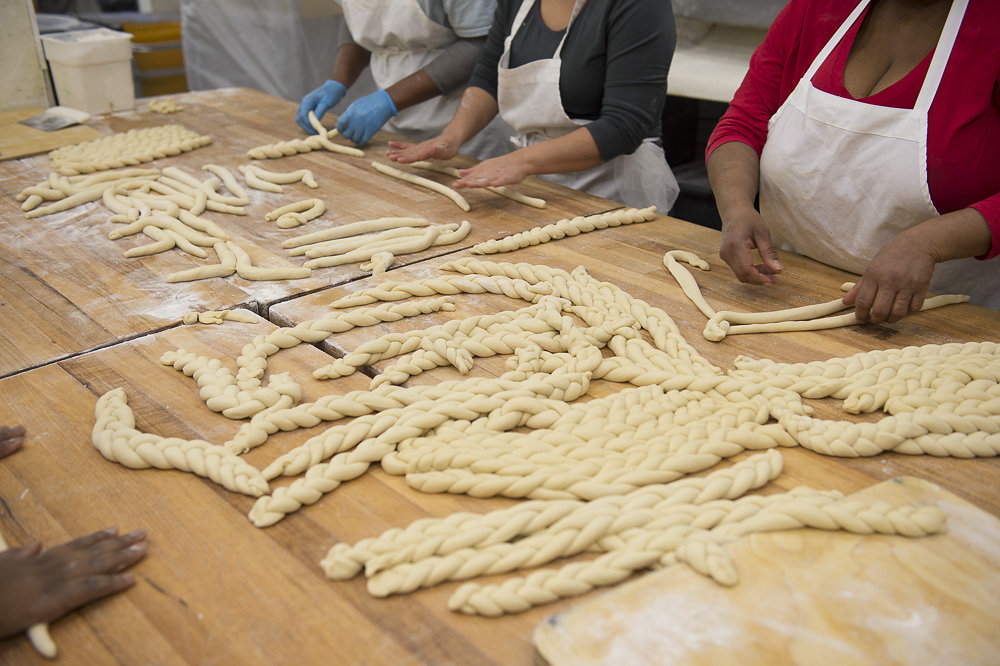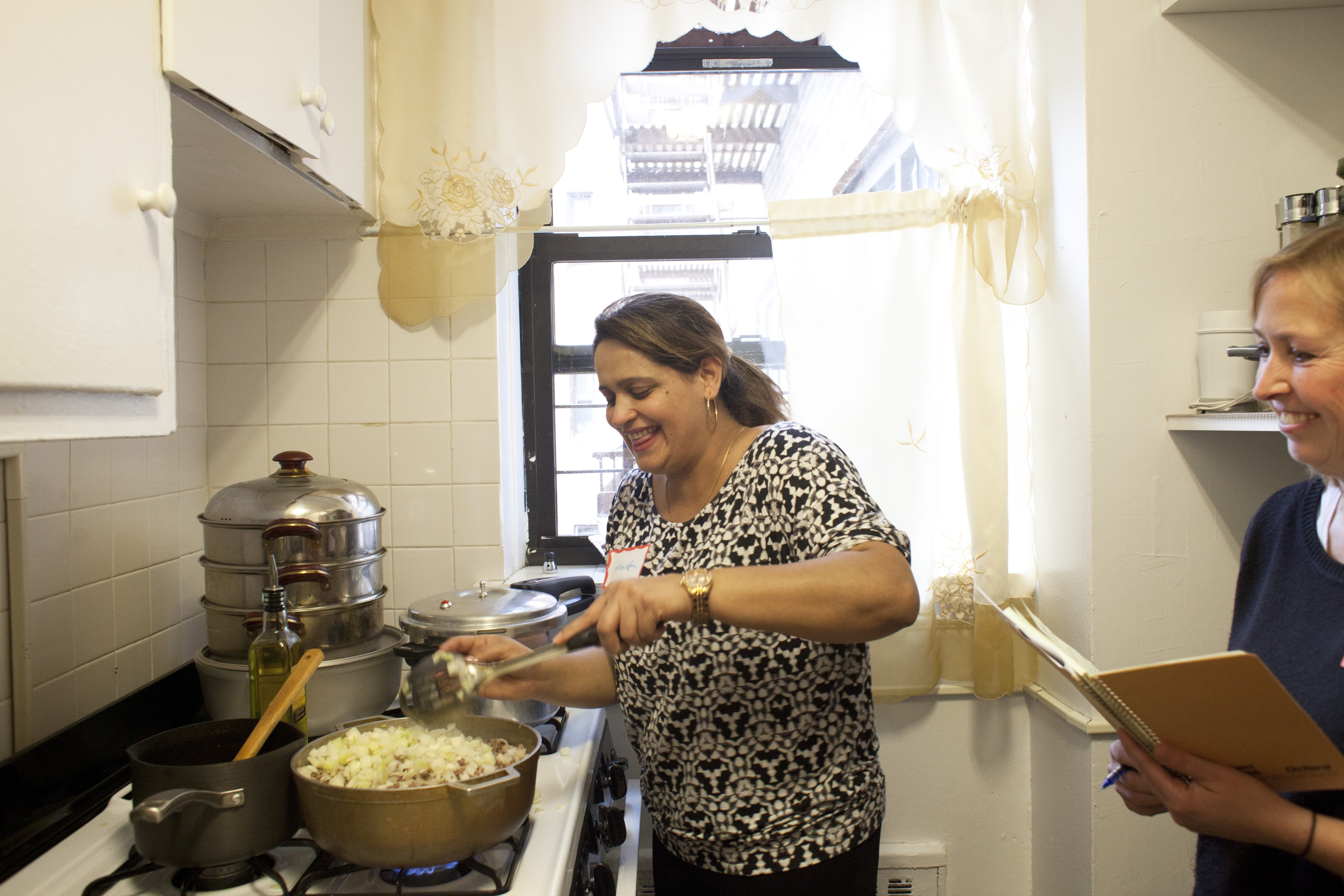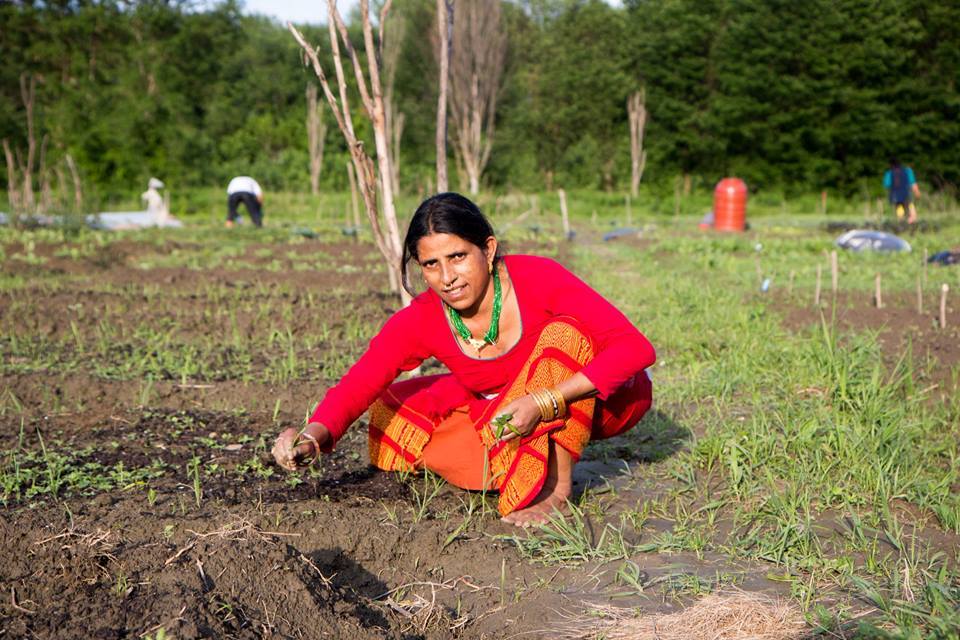Refugees often arrive in America hopeful for a new start, but also uprooted and confronting a tidal wave of loss of familiarity, ritual, and security.
One powerful way to keep that connection to home alive—while providing economic security and a sense of grounding in a new community—is food. Through cooking and farming, nonprofits and for-profits alike are welcoming refugees to America with a rare opportunity to preserve their past, while building a new life. Here, we take a look at some of the organizations paving the way to a new life for migrants.
Eat Offbeat delivers authentic, home-style ethnic meals that are conceived, prepared, and delivered by refugees resettled in New York City. The company was launched in 2014 by Manal Kahi, a native of Lebanon who was struck by the lack of decent hummus in New York City. She tinkered with the idea of creating a hummus business, but then decided to think big picture.
“There is a Syrian refugee crisis, and we wanted to help,” she says. “Maybe Syrian refugees could make the hummus?”
The idea sounded good to her brother, Wissam Kahi, a business consultant with an MBA. But every country has at least one dish worth sharing, and the siblings realized adventurous New Yorkers might want to try something more than hummus.
 Immigrant and refugee bakers braid challahs. Photo courtesy of Hot Bread Kitchen.
Immigrant and refugee bakers braid challahs. Photo courtesy of Hot Bread Kitchen.
The goal with Eat Off Beat was two-fold: To allow talented home cooks to share their culture through their cuisine, and to provide them with steady employment and a future.
“We help to create opportunities for talented refugees resettled in the New York area, and contribute to making them feel valued and welcome,” Kahi says.
Eat Off Beat now employs refugee chefs from Nepal, Eritria, Syria, Iraq, and Tibet who prepare meals in a commercial kitchen under the direction of executive chef Juan Suarez de Lezo. Menu items include dishes like Iraqi salad with sumac and olive oil, Eritrean lentil puree with hot berbere spices, and Nepalese cauliflower fritters. Delivery is available in Manhattan, Brooklyn, and Queens at a price point of about $20 per person, and are popular among the dinner party set as well as at more corporate offices. They hope to start doing individual deliveries in the near future.
“Eat Offbeat is the only place where I don’t have to adapt,” said chef Rachana Rimal, from Nepal. “I just cook the way I love to cook and people enjoy my food the way it is.”
League of Kitchens is an immersive culinary experience in New York City where immigrants teach intimate cooking workshops in their homes. Lisa Gross, whose mother is Korean and father is American-Hungarian, founded the company after her grandmother died; she felt the Korean food she had cooked was lost and wanted a way to reclaim those cherished tastes.
“The written recipes just didn’t translate; there is something about cooking with someone who knows the food intimately that is lost when that person is gone,” says Gross.
Her grief over the loss of her grandmother sparked an idea for a new kind of cooking school, which now employs immigrant cooking instructors from Lebanon, Bangladesh, Argentina, Greece, Uzbekistan, Trinidad, Japan, India, and Afghanistan.
 Nawida Saidhosin, a refugee who was born in Kabul, Afghanistan, teaches students to cook classic dishes like stewed eggplant and mandu, or dumplings, all in her own home kitchen. Photo by Lisa Gross.
Nawida Saidhosin, a refugee who was born in Kabul, Afghanistan, teaches students to cook classic dishes like stewed eggplant and mandu, or dumplings, all in her own home kitchen. Photo by Lisa Gross.
“With us, you go into someone else’s grandmother’s home and cook with her, you learn her family recipes in her family’s home, but you also share stories, connections, and a one-of-a-kind experience,” said Gross. “New York is such a diverse city, but there’s not a lot of interaction between cultures. When you are a guest in someone’s home, you get to know their culture in a new way.”
One of their instructors is Nawida Saidhosin, a refugee who was born in Kabul, Afghanistan and immigrated to the US in 2010 through the International Rescue Committee. She teaches recipes like burani bonjon—a flavorful dish of fried eggplant stewed with tomatoes, garlic, and green chilis, and topped with a tangy garlic-yogurt sauce and a sprinkle of dried mint, and tukhum bonjan, a traditional breakfast dish of eggs scrambled with fresh tomato, chilies, and garlic.
“When they like it, and say it’s delicious and amazing, it makes me so happy,” she says. “Cooking keeps my food alive. If you don’t cook it, you forget about it.”
The International Rescue Committee’s New Roots Program
Each year, the International Rescue Committee helps thousands of refugees fleeing war and persecution who have been granted sanctuary in the U.S. Through its New Roots agriculture programs, it gives hundreds of these resettled refugees in the U.S. the training they need to grow healthy food. The program started in San Diego, and has grown to include Seattle, Phoenix, Salt Lake City, Dallas, Boise, Charlottesville, Baltimore, and New York City.
“When I came to New York, I felt lost,” recalls Angele, who grew up on her grandmother’s farm in West Cameroon, a country plagued by political instability. “All I saw were tall buildings, and I thought, ‘where am I?'”
The IRC’s Drew Gardens, a 2.5 acre plot on 174th Street and East Tremont Avenue, became her oasis when she resettled here; she planted garlic, tomatoes, peppers, and even peanuts, which she’ll grind into peanut sauce come September.
She’s put down figurative roots as well. “I have found solace here,” she says. “I sing to my plants, to the grass and the trees. And when I sing, I have hope for a better life.”
Many refugees have deep agrarian traditions that include organic practices, food preservation, and seed saving, and the ability to continue these practices in their adopted homeland is invaluable. New Farms for New Americans helps refugees do just that.
 A refugee farmer plants seeds in Vermont. Photo via Facebook.
A refugee farmer plants seeds in Vermont. Photo via Facebook.
Located in Vermont, NFNA provides subsistence-size plots of land to refugee farmers, giving them the opportunity to feed their families and live a more food secure life. NFNA supports a community of 90 farmers from Africa and Asia by overseeing six acres of farmland, providing workshops on the specifics of farming in Vermont, and helping farmers to overcome the barriers that may prevent them from receiving farming and gardening technical skills.
“I came here as a refugee, and I have many opportunities,” said Abdi Abdi, a Somali-born farmer. “One of those opportunities is to farm, to have our own products, to eat or our own food without having to wait for the government. I have figured out that that I can help people if I grow my corn. I feel great giving back to the community by sharing what I have planted on my farm.”










